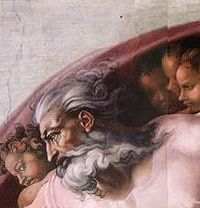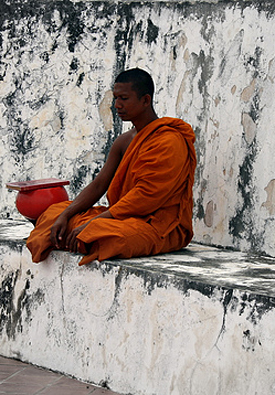I was about fourteen when I realized I wasn’t a Christian. I wasn’t really raised anything in particular, my parents are both indifferent agnostics, but I went to Catholic school from the first grade on. Earlier if you count the preschool run by Peter Paul and Mary (no joke).
 As a child I sort of became a Christian by default because all my friends were. At some point though, I got sick of “have faith” being the answer to all unanswerable questions, and I couldn’t find any better reason to believe anything I’d been told in religion class.
As a child I sort of became a Christian by default because all my friends were. At some point though, I got sick of “have faith” being the answer to all unanswerable questions, and I couldn’t find any better reason to believe anything I’d been told in religion class.
For a while I was a pantheist. Looking at all I knew about world religions, it seemed like they all had so much in common that there must be a grain of truth in there somewhere, and I figured all religions were probably just different faces for the same thing.
Only the faces seemed to be the main thing that most religions seemed to have in common. The concept of a personified god was, if not universal, at least pretty frequent, and that was the idea that I found least plausible. I made the google/wiki assumption: that what most people believe must be true, but as with Christianity, eventually I lost sight of any reason to believe it. I called myself a pantheist right up until I realized I was using it not as a personal belief system, but as a catch-all just in case. I had lost faith, not just in gods, but in Man’s ability to know the truth.
 This led me to look more closely at Eastern religions, particularly Buddhism. I found reincarnation overly convenient, but otherwise the ideas of Buddhism attracted me. With one problem. I am, at heart, a materialist.
This led me to look more closely at Eastern religions, particularly Buddhism. I found reincarnation overly convenient, but otherwise the ideas of Buddhism attracted me. With one problem. I am, at heart, a materialist.
I don’t mean that in the Christmas shopping sense, the need of acquisition, I mean materialism in a deeper sense. Attachment, the sin of Buddhism, is something I can’t seem to avoid. I don’t so much strive for possessions as I do sorrow at loss. I am not a pack rat, it’s not so simple, but I think this is the secret of pack rats. The idea of something being destroyed, or worse, forgotten, is unbearable, as though mere objects have meaning. When I was two, I had a teddy bear that had been my mother’s when she was a child. I lost it in the grocery store, and the idea still haunts me. I’m an artist of ink and paper, but I’ve always disdained things made of paper, because of their temporal nature. They fade, and crumple to nothing. Food is even worse, because it is meant to be disposed of.
 Last month, my favorite teacher died of cancer. While she was sick, even before I even knew this time would be the last time, I felt the need to find her first book, and buy it. When I heard she died, I was seized, irrationally, with the desire to go to school and photograph her door. The idea that it could disappear, that her office would be emptied and occupied by another, was heartbreaking. Instead of taking pictures, I went to find the packed away chapters of my book, and cherished each spider thin comment.
Last month, my favorite teacher died of cancer. While she was sick, even before I even knew this time would be the last time, I felt the need to find her first book, and buy it. When I heard she died, I was seized, irrationally, with the desire to go to school and photograph her door. The idea that it could disappear, that her office would be emptied and occupied by another, was heartbreaking. Instead of taking pictures, I went to find the packed away chapters of my book, and cherished each spider thin comment.
I have a friend who assigns feelings to objects. When he is forced to choose a piece of fruit, or a gift, he is slightly afraid of hurting the feelings of the rejected objects. I don’t feel this, but I can understand it. There is something holy about things. Something tragic. When I see a beautiful sky, I feel regret, not only because I cannot share it, but because I cannot keep it, because it will never be again.
It all comes down to death. I can pretend that things are permanent, If I save every image digitally, I can tell myself it will live forever. If I were a Buddhist, I would have to admit that everything is temporary. I know this is true, but I can’t do it. I can’t let go.
4 Replies to “Clinging to the World”
Comments are closed.